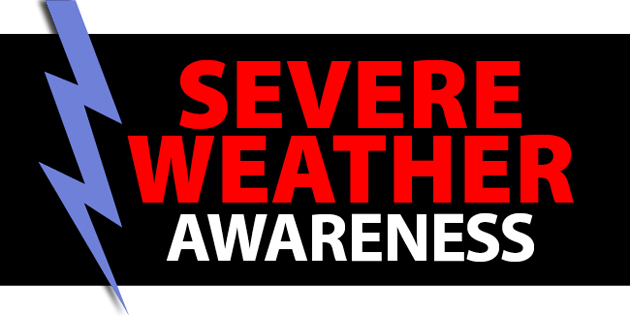 March 3 marks the two-year anniversary of the Nashville tornado, and May 1 marks the 12th anniversary of the Nashville flood. Feb. 20–26 is National Severe Weather Awareness Week, and the Office of Emergency Management is sharing information to help prepare the Vanderbilt community in the event of a weather emergency.
March 3 marks the two-year anniversary of the Nashville tornado, and May 1 marks the 12th anniversary of the Nashville flood. Feb. 20–26 is National Severe Weather Awareness Week, and the Office of Emergency Management is sharing information to help prepare the Vanderbilt community in the event of a weather emergency.
Vanderbilt Severe Weather Warning System
Vanderbilt contracts with a commercial weather monitoring company to alert the university when severe weather is approaching Vanderbilt’s campus. If a tornado is detected and is forecast to reach Vanderbilt within 15 minutes, an AlertVU is disseminated, and the outdoor warning system is activated.
Sirens on the main campus will sound to notify the Vanderbilt community of the approaching severe weather. The sirens on campus have a steady tone and can be heard across campus. Sirens are tested on the first Saturday of the month (barring any severe weather or other event) after Metro Nashville’s own siren test at noon.
AlertVU
Vanderbilt also employs a mass notification system known as AlertVU for use during emergencies. It is available free* to students, faculty and staff. AlertVU messages are automatically sent to all Vanderbilt email addresses; however, it is recommended that you have multiple ways to receive emergency notifications. Vanderbilt community members also may register other email addresses, landlines (for voice calls) and cell phones (for voice calls and text messages) to receive these critical alerts. Information provided by subscribers is private and will not be shared.
To register, update an existing account or learn more, visit Vanderbilt’s Emergency Management website.
The AlertVU desktop alert program displays full-screen alerts on workstations and desktops across the university. When an AlertVU message is activated, all computer monitors will display the alert, and the user must acknowledge the message before being able to continue using the computer.
*There is no charge to receive AlertVU messages. If you choose to receive text messages, however, your cell phone carrier may charge you to receive them.
Tornado watches and warnings: What to do
- Before the tornado watch:
- Make your plan.
- Where will you be when storms are forecast to impact your area?
- How will you get information?
- Know your best shelter location.
- Look for an interior room with no windows and on the lowest possible floor—think bathrooms, closets, stairwells and basements.
- Prepare your go-kit.
- Make your plan.
- Tornado watch:
- Tune in to your apps/news channels for information.
- FEMA app
- Local news apps
- Tune in to your apps/news channels for information.
- Tornado warning:
- When an AlertVU is received and/or the tornado sirens sound on the main campus, you should take shelter in the lowest level of the closest building.
- Move toward the middle of the building, ensuring you are away from windows. Put as many walls between you and the outside as possible.
- Monitor weather reports.
- A follow-up AlertVU message will be disseminated once the threat has passed.
Flooding: What to do
- When you come across a flooded road, do not attempt to cross it. Turn around and look for a different route.
- A vehicle can also be swept away, floated or flooded.
- Don’t walk through flood waters.
- Debris and chemicals in the water can cause infection or other injuries.
- It only takes a few inches of moving water to knock a person off their feet.
For more information about preparing for severe weather as well as other types of emergencies, visit the Emergency Management website.